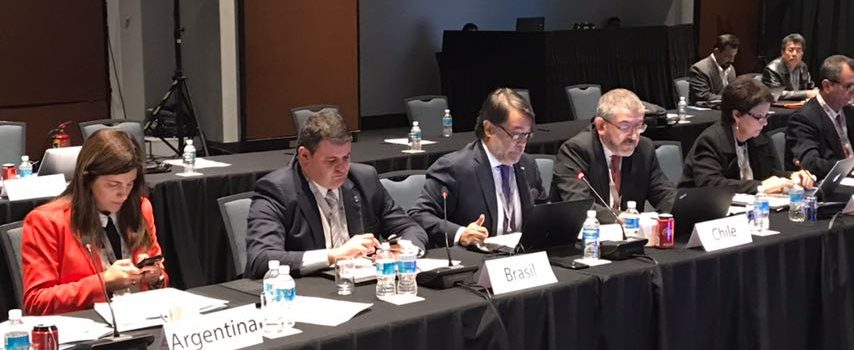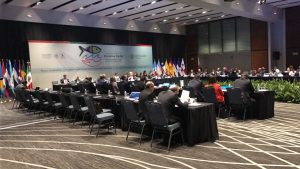Chilean Delegation participates in “Blue Growth” meeting for Latin America and the Caribbean
December 4th, 2017This activity is organized by Mexico Aquaculture and Fisheries National Commission (CONAPESCA) and United Nations Organization for Food and Agriculture (FAO).
On November 27th and 28th , “Blue Growth” International Meeting for Latin America and the Caribbean was held in Mexico City, which brought together 15 countries main fisheries and aquaculture regional authorities. Executive Director of Fisheries Development Institute (IFOP) Leonardo Núñez, National Fisheries and Aquaculture Service National Director Sernapesca) José Miguel Burgos and Sernapesca Sub Director of Fisheries, Jorge Toro Da Ponte Chile were there representing Chile.
This meeting general objective of is to increase sustainable fisheries and aquaculture contribution to food security, overcoming poverty and, in general, strengthening aquatic ecosystems associated economy in Latin America and the Caribbean countries . Which always represents a sustainable logic.
FAO promotes the so-called Global Blue Growth Initiative (IGCA), a set of programs and projects whose main objective is “conservation and sustainable contribution of biological resources and environmental services of marine, coastal and continental ecosystems to food and nutrition security and poverty alleviation “.
It should be considered that in 25 years, global population will exceed 9 billion, and according to ECLAC estimates, by 2060, the Latin American and Caribbean region will host some 790 million people. In this scenario, security, availability and access to food is a priority issue for the planning of current food policies.
For FAO, fish protein will play a fundamental role in coming decades, taking into account its rapid growth (mainly from aquaculture) with respect to other food producing sectors. According to data from the international organization, seafood contributes 17% of the animal protein consumed globally. By 2030, around 88 million tons of ADDITIONAL fish and shellfish will be needed to meet the population’s demand. The challenge is then, to solve how can produce more food of hydrobiological origin in a sustainable way and without damaging the environment.
ENDING ILLEGAL FISHERIES AND PROMOTING RESPONSIBLE CONSUMPTION
The participating countries agreed to strengthen their joint efforts against undeclared and unregulated illegal fishing, developing training initiatives and experiences exchange.
Currently, thirteen countries in the region have formally adopted Port State Measures Agreement, which aims to eliminate illegal, unreported and unregulated fishing: Bahamas, Barbados, Chile, Costa Rica, Cuba, Dominica, Grenada, Guyana, Panama, Peru, Saint Vincent and the Grenadines, Saint Kitts and Nevis, Uruguay.
The fifteen nations present at the meeting in Mexico expressed their intention to strengthen the Aquaculture Network of the Americas in aspects such as the management of transboundary diseases, support for small farmers.
In addition, they discussed ways to stimulate fishery and aquaculture products consumption, to promote intra-regional trade in these products, to incorporate these foods in school snacks and foster South-South and triangular technical cooperation initiatives.
On the other hand, representatives of Argentina, Chile, Mexico and Peru indicated that they will make their research vessels available to the region, to improve state of marine resources knowledge, keys to regional food security. In this sense, IFOP Executive Director, Leonardo Núñez, indicated that “we were able to share our experience in matters of scientific collaboration with the region, such as the creation of Pacific Alliance fisheries network and aquaculture research institutes composed by Chile, Colombia, Peru and Mexico; as well as IFOP recent collaboration provided to Panama Water Resources Authority, for a program of scientific observers design in its fishing fleet. Our experience was highly valued by Blue Growth Global initiative, and we left a good path for future collaborations, which would allow us to position ourselves as knowledge providers for the region. ”
José Miguel Burgos, National Sernapesca Director , explained that “in working groups we addressed the design of a regional strategy to strengthen the fight against illegal fishing in international and territorial waters, and in that area we were able to present the chilean experience showing measures that we have incorporated in order to discourage this action, with control actions, technology and prevention, in which communities participation has been vital to continue moving forward in this country commitment that we have proposed. ”
Burgos also recalled that Sernapesca Inspection School is offering online courses to other monitoring bodies of the continent through FAO platforms, “in order to convey the positive experiences we have had in this matter.”
“Another addressed issue was legislative branch role in supporting fisheries and aquaculture sustainable development, and there we could state that Chilean Congress is currently discussing the Institute for the Development of Fisheries and Aquaculture, INDESPA creation, which will benefit directly from artisanal fisheries and productive diversification, and Sernapesca Modernization Project, which provides new tools to effectively battle illegal fishing, focusing on those who finance this illegal activity and who are at the productive chain end, unlike what happens now, where the sanctioning focus is on the fisherman, ” the Director said.
“Finally, we work on how we can advance in control and control capacities increase, in order to sustain aquaculture in Latin America and the Caribbean development, and in this context, South-South cooperation strengthening will be a key challenge in the next few years, “he concluded.

